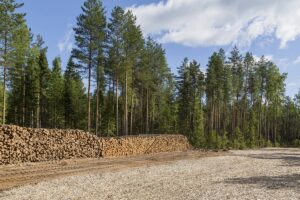In our 2024 virtual Applied Forest Finance course, I will include investment implications and analysis of forest carbon as relevant to forest owners. This builds on years of tracking forest carbon markets and pricing, which feature unique and somewhat irregular profiles. For example, in 2022, we wrote about forecasting forest carbon prices, and noted that, “the supply of forest carbon credits, unlike forest supplies themselves, require enrollment and validation processes that are somewhat disconnected from actual demand.” Recent reporting affirms this reality while putting into stark context the status of carbon emissions relative to sequestration efforts and forest carbon pricing.
Trees vs Technology
According to Casey Crownhart of Technology Review, carbon emissions, while slowing, look to reach all-time highs in 2023 while efforts to remove carbon and other greenhouse gases (GHGs) from the atmosphere remain, relatively speaking, “miniscule.” The ratio of emissions-to-removals remains daunting:
“…emissions from fossil fuels were millions of times higher than carbon removal levels this year.”
To date, forestry has played a larger role in carbon sequestration than technologically driven approaches. Unfortunately, while nature-based solutions such as afforestation and replanting have progressed, they continue to play catch-up when compared to deforestation and other sources of land-use change.
Carbon Prices and Forestry
In 2022, Forisk conducted break-even analysis of one-year harvest deferral contracts for landowners associated with forest carbon. While these types of one-year deferral programs are no longer marketed, the analysis remains helpful for evaluating opportunity costs and providing context. The results indicated that per acre payments for a mature loblolly pine forest in the Piedmont region of the U.S. South, inclusive of opportunity costs, would exceed $40, depending on key timber price and forest growth assumptions, and landowner investment horizons. At the time of that analysis in 2022, carbon credits in the U.S. traded around $8.
More recently, in November 2023, the Asian Development Bank’s climate envoy told Reuters that investors and emitting firms require carbon offset prices in the $25 to $35 range to spur activity. And yet, the price per credit remains in the $8 range for sequestering carbon in forests via the voluntary market, or up to $11 according to Ecosystem Marketplace.
Forest carbon markets, in facilitating trade between buyers and sellers, assign values that, effectively, set prices on the “right” to emit carbon dioxide into the atmosphere. However, current price levels reflect a certain uncertainty on the part of investors. Emitting firms logically prefer the lowest-cost options available to them, which include improving energy efficiency and growing wind and solar energy capacities, in addition to growing forests. Unfortunately, low prices also demotivate firms and disinterest investors, which could affect participation by forest owners and others in 2024 and beyond.
This content may not be used or reproduced in any manner whatsoever, in part or in whole, without written permission of LANDTHINK. Use of this content without permission is a violation of federal copyright law. The articles, posts, comments, opinions and information provided by LANDTHINK are for informational and research purposes only and DOES NOT substitute or coincide with the advice of an attorney, accountant, real estate broker or any other licensed real estate professional. LANDTHINK strongly advises visitors and readers to seek their own professional guidance and advice related to buying, investing in or selling real estate.










Carbon capture, carbon forest every one knows is a scam. Go back to 3rd grade science. Go woke, Go broke.